HIT CHANNEL EXCLUSIVE INTERVIEW: March 2023. We had the great honour to talk with a legendary drummer: Chris Slade. He is best known as a member of AC/DC (in two different periods). He has also played with Manfred Mann’s Earth Band, The Firm (featuring Jimmy Page and Paul Rodgers), Tom Jones, David Gilmour, Asia, Uriah Heep and Gary Moore. Nowadays, he is busy touring with The Chris Slade Timeline playing songs from his entire career. Read below the very interesting things he told us:
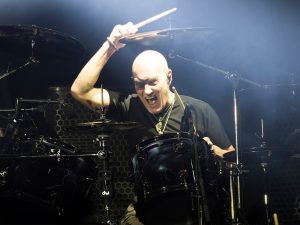 You are busy doing concerts with your band, The Chris Slade Timeline. What should fans expect during these shows?
You are busy doing concerts with your band, The Chris Slade Timeline. What should fans expect during these shows?
We always do a lot of AC/DC. Half of the set is AC/DC, the other half is other material such as Manfred Mann’s Earth Band, Uriah Heep, Jimmy Page, David Gilmour, people like that. So, it’s a very varied set and duly takes about two hours to play. Nobody is ever disappointed.
It seems that you are very happy with the line up of The Chris Slade Timeline, aren’t you?
Oh yeah, very much so. It’s one of the best bands I’ve ever been in. Almost unknown, of course, but the musicians are just fantastic. They really are world class, first class. They ‘ve been playing together since they were 10 years old, some of them and they are 35 now.
Could you imagine how your music career would have been, if you hadn’t worked in that shoe shop in Cardiff?
No, I just can’t imagine. That was some synchronicity, you know. But the guitarist of Tom Jones -well, he wasn’t Tom Jones yet, Tommy Scott and the Senators- walked in and I knew that they had got ridded their drummer the night before. So, I went up to him and I said: “I’m a drummer, you need a drummer and I live by Tom”, which I did (laughs). Yes, that was a red letter day. I can’t remember what date it was, but it was in 1963.
How important was the period you played with Tom Jones to your later career?
It was very formative. We started as a rock band, if you like -we didn’t call ourselves that, in those days- with leather jackets and jeans, Tom included and we were playing rock music. I mean, rock ‘n’ rock: Jerry Lee Lewis, Chuck Berry, all sorts of things and Tom could sing. He could sing Little Richard, which is very-very difficult to do and singing it well. But it was very formative for me because I started playing drums with jazz, because that’s where all the good drummers were. In those days there were no good pop drummers that you could hear. So, I listened to jazz, along with many other drummers, people like Cozy Powell (Rainbow, Black Sabbath), people like that. So, it enabled me to go from being a rock ‘n’ roll drummer to play with Count Basie, with Tom Jones in the end. So, that was really something.
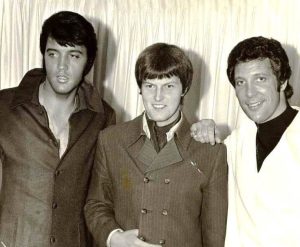 Was it an interesting experience to meet Elvis Presley?
Was it an interesting experience to meet Elvis Presley?
Yes, it was brilliant. Absolutely brilliant. I think I was 21 at the time and we were in Las Vegas doing a show and he was in that with his entourage, you know, the Memphis Mafia (laughs). That wasn’t the first time I met him; the first time was in Hawaii. He came with his wife, Priscilla and he just came to see Tom perform and he realized that Tom was a really big threat. So, that’s why he did a comeback and that’s the truth, that is a fact.
Who played drums in Tom Jones’ “Raise Your Hand” duet with Janis Joplin on “This Is Tom Jones” TV Show? Is it you?
I didn’t do that series. That was Ronnie Verrell, a fantastic session drummer. He was one of the top in Britain and he was a great player. I learned a lot watching him, actually.
Were you frustrated when you learned that everybody else from Tom Jones’ touring band was getting paid three times the money you were being paid?
“Disappointed” is not the word, it was terrible. I left immediately. When the plane landed, I just walked away, because we, Tom Jones & the Squires, had all started together in London for maybe two years, before Tom made it and then we were with him for, I don’t know, maybe another five years, after he had made it; I haven’t worked out the dates. Then, we all got the sack, we all got rid of by the manager. But after about a year or so, I went back with Tom because The Squires were going nowhere.
Are you proud that Manfred Mann’s Earth Band’s “Nightingales & Bombers” (1975) is considered a classic album?
Yes, I ‘m very pleased about that. Funny enough, Timeline were talking about that, just the other day, that very album. We were in a recording studio, Timeline and somebody brought it up and Steve (ed: Glasscock), the singer, said he bought it when it came out. So, yeah, I’m very-very pleased about that and “Solar Fire” (1973) also, actually. People slip in the concerts and they bring all the Manfred Mann things for me to sign and there is a load of them (laughs).
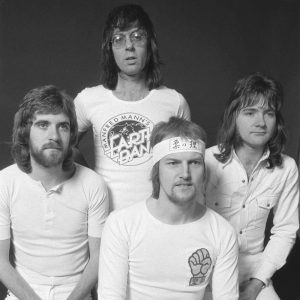 I love your playing in a live version of “Father of Day, Father of Night” from a Stockholm show in 1973. Do you remember that performance?
I love your playing in a live version of “Father of Day, Father of Night” from a Stockholm show in 1973. Do you remember that performance?
No, I don’t, to be honest (laughs). No, I don’t remember properly. The shows with Earth Band were great. Really-really good shows. They were all great musicians. Mick Rogers (guitar) was a great soloist. It was more of a jamming band than it was a pop band. It wasn’t a pop band at all. Of course, Manfred Mann’s Earth Band was a rock band and we were more like Cream than we were like anything else. We were just jamming.
Were you surprised when Manfred Mann’s Earth Band cover to Bruce Springsteen’s “Blinded by the Light” reached #1 on the Billboard Hot 100 in 1976?
Yes, we were all very surprised and very grateful too, because we had been trying for years to get a hit record, because you couldn’t go anywhere in those days without a hit record. So yes, we were very pleased indeed and it sold millions throughout the world and became #1 almost everywhere, I think. That was Manfred’s arrangement, because the original is nothing like our record.
It seems that Manfred Mann is a big Bruce Springsteen fan because he covered “Spirit In the Night”, “Blinded By the Light” and “For You”. Do you understand his obsession with Springsteen’s debut album, “Greetings from Asbury Park, N.J” (1973)?
Well, what happened was, we -when I say “we”, it was me and Manfred, actually- each got a copy of “Greetings from Asbury Park”, which had disappeared with nobody bought it, nobody at all bought it. It just fizzled out and disappeared the first time it was released. So, somebody gave us a copy each of that, which we took back home. We played the same shows, the same night clubs, I should say, as Springsteen did with his band, on the east coast and we really liked it. I was a big fan of Springsteen, big-big and Manfred took a song from it and just re-arranged it completely. The result was “Blinded By the Light”. Of course, the whole Earth Band put ideas towards it because we ought to give production ideas, but Manfred came up with the original piano thing and a few other things, too. So, yeah, that’s the story of that and it was Bruce Springsteen’s first ever hit record. He may not have been known to the world without Earth Band’s record.
Was it a bit weird that David Gilmour and Jimmy Page called you on the same day to join their bands?
Yes (laughs), that’s true, really true story. I got a call in the morning from David Gilmour and then in the early afternoon from Jimmy Page and I couldn’t believe it. I could not believe it. It was such a buzz! Jimmy Page waited about nine months me to come back from the road with Gilmour.
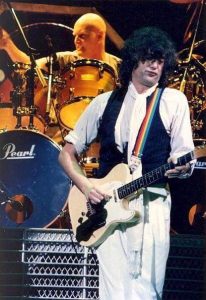 Was Jimmy Page an easy-going person to work with?
Was Jimmy Page an easy-going person to work with?
He is a very humble, unassuming person, believe it or not. He never demanded any particular way of playing or anything like that. He was -if it’s possible- just a band member and he only wanted to be a guitarist, which is great. He had a great attitude, Jimmy.
Do you consider The Firm a successful band?
Yes, it was very successful when we were doing it. A lot of people, like Earth Band, still come to Timeline shows and say: “Now, The Firm is one of my favourite bands”. So, it still, even now, all these years, there are still fans of The Firm.
You played drums when Jimmy Page jammed with Jaco Pastorius at the Lone Star Cafe in NY in 1985. What memories do you have from that night?
Before they start filming it, I started the jam with Jaco and they didn’t film that. I did about a 20-minute jam with Jaco Pastorius, just me and him. It was such a buzz and it was really good. I came off stage and the guys were teasing me, because it was so good. Because before that, his band hadn’t showed; Jaco’s band had not showed yet. I went to Jaco -he was sitting on the stage and I said to him: “Your drummer hasn’t showed. The drums are set up. Your drummer hasn’t showed yet. I’m a drummer. Do you wanna play?” It was literally that (laughs) and I told him that I worked at Madison Square Garden with Jimmy Page and he went: “Were you in Jimmy Page’s band?” I said: “Yeah”. He said: “Get on stage” (laughs). I got on stage then and he looked at me and I looked at him and he said: “You start”. I went: “Oh, no!” We were doing this jam for 20 minutes, maybe longer, and it was great. It was one of the great buzzes of my life and a great honour to play with Jaco because he ‘s not only my favourite bass player, he’s probably my favourite musician of all time, you know, with Weather Report and all that. It was incredible! So, when you see Jimmy Page jamming with Jaco, I turned out to be during that and I played for 20 minutes before that and of course nobody filmed it. Yeah, incredible buzz.
How challenging was it for you to adjust your drumming when you joined AC/DC?
I was so lucky to be able to play AC/DC and also Count Basie. Luckily, I have the technique to be able to do that. I don’t know how, but I did. As I said, I started with jazz, I listened to jazz records. When I joined AC/DC, I had been playing in the music business for, I don’t know, 30-40 years, something like that, so I knew my trade and what AC/DC wanted. You know, they want: “boom-bas/ boom-bast/ boom-bat/ bat”. It sounds simple but they also want a great feel to the drums. They want to feel right and be on the case. It is what the Americans call “pocket playing”. It’s being in the pocket, in the groove. You hear it on the soul and rock ‘n’ roll records. There is such a great feel. I can’t explain it unless you… A musician would understand what I’m saying.
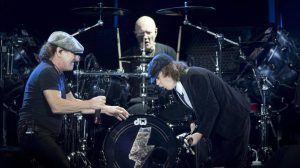 Obviously, your playing in “Thunderstruck” (from AC/DC’s “The Razors Edge” album in 1990) is remarkable. Please tell us everything we should know about this song?
Obviously, your playing in “Thunderstruck” (from AC/DC’s “The Razors Edge” album in 1990) is remarkable. Please tell us everything we should know about this song?
Yes, I understand that now. At the time, it was just another song. They said: “Here’s another song”. Bruce Fairbairn, the producer (Aerosmith, Bon Jovi), put the bass drums on (ed: with a heavy voice) “THUN-DER”, which was a great idea because AC/DC don’t like overdubs, usually. They like to play in the studio all together, all five of the band, even Brian (ed: Johnson –vocals). Playing all at the same time, over and over, like ten takes at the time, until they get right. So, Bruce Fairbairn said to me: “Could you ‘boom-boom’, when the word ‘Thunder’ comes up?” I said: “Yeah, of course” and he looked at me and went: “Really?” I went: “Yep!” He thought it might be difficult, but it wasn’t (laughs). I ‘m very pleased he thought of that.
You rejoined AC/DC in 2014. Do you think the fact that you didn’t expect their call, made you to enjoy the Rock or Bust tour even more?
Yeah, I really did not expect it. It was a complete surprise. Even fans were going: “I think they will call you again. I think they will call you again”. I said: “Look, they are not going to call me. I think they are not gonna call”. It spread out (ed: the rumour) for weeks, maybe even longer and suddenly, I was in Switzerland with Timeline and I got a call and it was from the manager and he offered me to rejoin them. Of course, I said: “Yes”.
In March 2016, Axl Rose replaced Brian Johnson in AC/DC during the tour. Please describe to us your reaction the first time he rehearsed with the band.
First met Axl at the rehearsal and not a rehearsal, an audition so called. We tried three or four singers out from various bands and they said: “Oh well, you know, Axl Rose tomorrow”. I went: “Alright, OK” (laughs). Knowing his reputation and things like that, I was very surprised when I met him, pleasantly surprised because he was a very nice guy. I should be stunned and I thought: “This guy is OK” and then he started singing and jeez, what a voice! What a voice! I had only known his Guns N’ Roses voice which is nothing like his AC/DC voice. So, I was very pleasantly surprised.
How much interaction did you have off stage with Axl and the other members of AC/DC during the Rock or Bust Tour?
Yeah, we used to socialize now and again, not all the time. Just at the hotel bar or something. Brian and Cliff (ed: Williams -bass) were usually there. Angus doesn’t drink at all and never has, so he was never there. But Cliff and Brian, Stevie (ed: Young –rhythm guitar) of course was there, sometimes Axl. Just occasionally, it wasn’t anything planned. It was just a hotel bar.
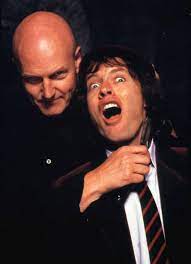 Keith Emerson told me: “The music in the ‘60s and ‘70s was more important to people. It was a huge event when The Beatles had a new album out. You should listen to Paul McCartney’s bass, you should listen to John Lennon’s lyrics. Nowadays nobody gives a shit about who the guitar soloist is on Lady Gaga album”. Do you agree with this?
Keith Emerson told me: “The music in the ‘60s and ‘70s was more important to people. It was a huge event when The Beatles had a new album out. You should listen to Paul McCartney’s bass, you should listen to John Lennon’s lyrics. Nowadays nobody gives a shit about who the guitar soloist is on Lady Gaga album”. Do you agree with this?
‘60s and ‘70s was great. Some great musicians, some great ideas. It was a very innovative time, people were trying all sorts of angles on music trying to get new ways of playing or presenting the music. It was very stimulating. So, I know Jimmy, but anybody is successful, they deserve that success, usually, because they worked hard for it and tried things. ‘80s, ‘90s, this century (laughs) as opposed to last century… but I must admit that my formative days were ‘60s and ‘70s, but as I said, I adapt to and if I hear something today that is new on the radio, a new drum lick or something, I am always interested in it. There is always innovation going on and people say: “Rock is dead”, “rap is the thing”, or whatever, they think: “garage is the thing perhaps”, but it is whenever you were born, which decade you were born in determines what music you like, but I would agree that ‘60s and ‘70s music was first class.
You jammed with Nick Mason at a Fantasy Camp in LA in the ‘90s. How did it happen and what song you played?
Yeah, I played with half of Pink Floyd (laughs). I played with all of Bad Company, too. Nick is a great guy, he’s funny as hell. He’s a really-really funny guy. He doesn’t seem to be when you meet him, but his sense of humour is fantastic. I remember one time at an interview somebody asked him about David Gilmour’s playing -and Gilmour has just an amazing tone, doesn’t he, just great musicianship- and he said: “Yes, David does have a unique way of playing: It’s fumbling, I think” (laughs). I think we played “Comfortably Numb”, actually.
Is there any bassist that you would like to have played with?
Well, Jaco would be the one, of course. But I did! What a buzz! He’s the only one that comes to mind, actually.
Had you ever played with Jack Bruce (Cream)?
Oh, no. Yeah, that would be really nice. He was a great bass player. I never thought of that, because I don’t see the fantasizing thing of that: “Oh, I wish I play with Jimmy Page”. I don’t do that, because I ‘ve done it already (laughs).
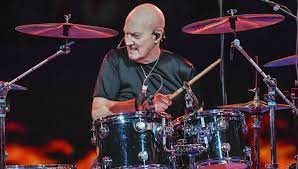 Do you have any musical ambitions left?
Do you have any musical ambitions left?
Yeah, I would like Timeline to be more successful. We play all over Europe and we drive to shows because we like to and we like to use our own equipment. It’s not a rental equipment. We ‘ve done a few flights and rented equipment, it’s been OK, but not like on your own gear. I don’t think anybody has ever been disappointed by any show we have ever done. They always complain when we finish. I’m very pleased about that and I’m very pleased I’ve got the musicians I’ve got.
Do you like Ringo Starr as a drummer?
Yeah. He swings, he really swings. That’s what I mean by feel, when I was talking earlier on. He gets your foot tapping. I think it was Duke Ellington that said: “You gotta get the guy at the back of the hall tapping his foot. If you can do that, you got it, mate”. That is true. You must try to include everybody and play with swing, feel and emotion, actually and try to involve the whole audience, no matter if it’s a million people -which is great too- or twelve people in a pub. It’s the same principle.
A huge “THANK YOU” to Mr. Chris Slade for his time. I should also thank Mrs. Christine Gyford Ceasar for her valuable help.
Official Chris Slade website: www.chrisslade.com
Official The Chris Slade Timeline Facebook page: https://www.facebook.com/ChrisSladeACDC

